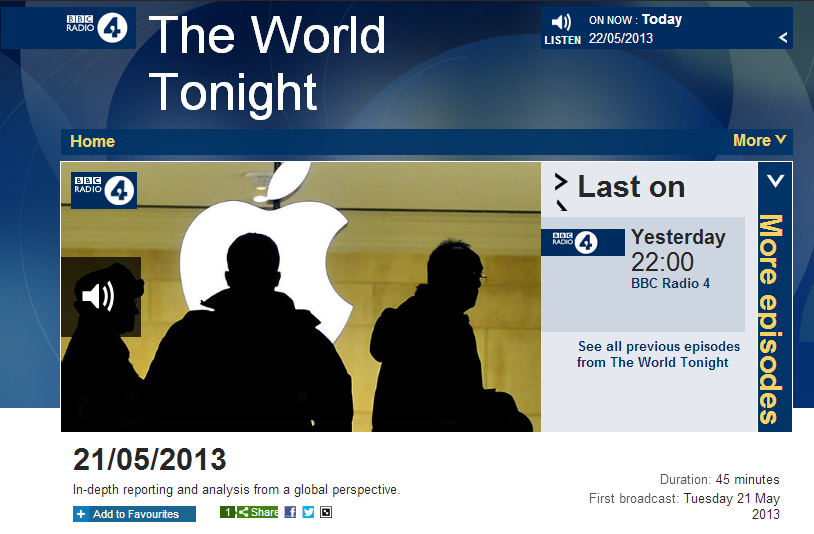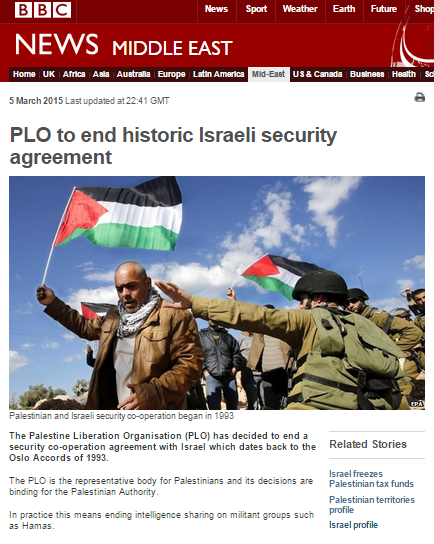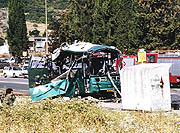h/t JK
In addition to the written version of Yolande Knell’s recent feature on offshore gas finds which appeared in the ‘Features & Analysis’ section of the Middle East page of the BBC News website, the subject was covered in an additional report by Knell which was broadcast on May 21st 2013 in ‘The World Tonight’ on BBC Radio 4.
The relevant section of the programme begins from 34:16 here, with Knell first visiting Lebanon and Israel. At 38:17 she reports from Gaza.
“Further south along the coast we reach the Gaza Strip, where dozens of men are dragging their empty gas canisters along the street as they queue to refill them. The Palestinian Authority awarded British Gas the licence to develop an offshore gas field here back in 1999, but so far it’s brought no benefits to locals. Gaza currently has serious shortages of cooking gas, partly due to border restrictions imposed by Israel.”
To drive the point home, listeners then hear an anonymous ‘man in the street’ say:
“Animals live a better life than us. Everyone here had to leave his business and stand in this long line to get a can of gas for his family. We pay a high price and we don’t get it easily.”
Knell continues:
“The conflict between Israel and the Palestinians has long held up plans to exploit Gazan gas. In 2007 the situation got more complicated when the Islamist group Hamas took control of the Gaza Strip and ousted their political rivals Fatah. Mohammed Shtayyeh is President of the Palestinian Economic Council for Development and Construction.”
Dr Shtayyeh says:
“Overall it is for us as Palestinians extremely frustrating that, you know, you have that natural resource there that should be a real wealth for the nation and you’re really not utilising it. There are some problems related to excavations and technical problems, but mainly political problems.”
Beyond the euphemistic statement that “in 2007 the situation got more complicated”, Knell does not make any real attempt to explain to her listeners that the main stumbling block preventing the exploitation of offshore gas near the Gaza Strip is the fact that the recognised representative of the Palestinian people (and hence the body tasked with administrating their natural resources) – the Palestinian Authority – has no control over the Gaza Strip due to the violent takeover of that territory by a terrorist organisation. Instead, Knell churns out the old mantra according to which it is “the conflict between Israel and the Palestinians” which is to blame. 
Especially insidious is Knell’s treatment of the subject of the shortage of cooking gas in the Gaza Strip, which she claims is “partly due to border restrictions imposed by Israel” – without making any attempt to clarify to listeners what the other part of that “partly” might be – and hence portraying the problem as an Israeli-created one.
So what are the facts behind the issue? Here is some recent (April 2013) relevant background information: [emphasis added]
“According to the data of the Land Crossings Authority at the Ministry of Defence, the infrastructure of Kerem Shalom meets the requirements and provides the necessary needs to transfer all goods into Gaza, including cooking gas, but the crossing infrastructure are not being exploited to its fullest when the volume of orders by gas suppliers from the Gaza Strip does not match the needs of the public. Here it should be noted that as part of the expansion of civil policy, in quarter A of 2013 Israel approved the transfer of tens of thousands of gas cylinders for domestic use.
From the data at the District Coordination Office in Gaza, we understand that there is a constant shortage of 1,300 tons of cooking gas (monthly average), about 60 tons of gas per day (daily average). Last year, gas smuggling from Egypt were reduced from 700 to 200 tons per month due to an internal crisis in the energy sector in Egypt. This reduction limits the amount of cooking gas in the market (and the ability to cope with its constant lack) and harms the population of the Gaza Strip.” […]
“There is no public entity in the Gaza Strip that supervises the cooking gas field and there is no public storage facility that allows accumulating surplus for “a rainy day”. During the summer months, the demand for cooking gas in the Gaza Strip declines as well as utilization of the infrastructure in Kerem Shalom crossing. In addition, the credit policy of the Palestinian Authority ‘s Energy Authority limits the local merchants in Gaza from holding sufficient supply. Extending credit lines will allow accumulating larger stock toward the winter.
Gaza have the option of diversifying its gas import sources and allow various Israeli companies to supply gas to the Gaza Strip, but the Palestinian Authority restricts import to one company and actually prevents from local merchants to import gas from competing companies and by this use the capacity at Kerem Shalom to its full extent.
During 2012 the Palestinian Authority reached a decision regarding reduction of cooking gas prices due to public pressure exerted around the protest of cost of living in the West Bank, decision that merchants from Gaza claim caused significant losses to those holding stocks at the stations. Therefore, there is concern among local merchants that the PA will reduce again the fixed gas prices set by law (and the lack of a mechanism for compensation), a move that reduce the economic interest of the merchants to hold stocks in the Gaza strip.”
So in fact, the shortage of cooking gas in the Gaza Strip actually has nothing to do with “border restrictions imposed by Israel” as claimed by Knell, but it does have rather a lot to do with the policies of the Palestinian Authority.
Knell obviously made no effort whatsoever to fact check the accuracy of her claim blaming Israel for the shortage of cooking gas in Gaza. In fact, she merely parrots the politically motivated propaganda surrounding the issue as put out by Hamas.
The knee-jerk blaming of Israel for any and every problem in the Gaza Strip may well be the quickest, easiest – and most fashionable – option, but BBC audiences expect far more from journalists committed to accuracy and impartiality.





